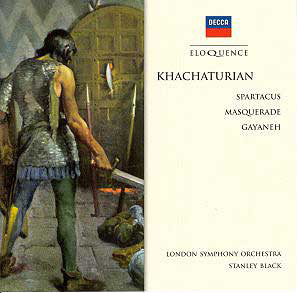Stanley Black's Khachaturyan LPs came out in the era
when one particular piece of his came to new fame through the BBC seafaring
drama, The Onedin Line. This used the great Adagio for
Spartacus and Phrygia as its signature. I remember that programme
making liberal use of classical scores including the Moeran Symphony
in G minor and Bax's November Woods.
Black, more renowned in the light classical side, gives
the Adagio (The Onedin Line music) one of its fruitiest
and most opened-out readings. He is blessed with glitzy Phase Four sound
but these versions do not match up to the composer's on BMG-Melodiya.
However he does make something quite special out of the Bolero-like
Dance of the Gaditanes where he sustains atmosphere and tension
extremely well.
The other two suites are five movement affairs. Masquerade
is wild and woolly, frilly and bumptious. If you find the Russian
or Armenian gaucherie of Svetlanov or Tjeknavorian just too much then
this might well be for you. In Masquerade's Mazurka things
really catch fire. Its vulgar steely borscht of Offenbach, the Can-Can
and Parisian japes comes off well in Black's hands. Gayaneh is
generously enjoyable even if it does comprise updated remnants of Borodin
(Prince Igor), Ippolitov-Ivanov's Sardar march, snatches
of Shostakovich and slices of Rimsky-Korsakov (Russian Easter Festival).
The crowning movement is a most lovingly shaped Dance of the Rose
Maidens - one of Khachaturyan's unsung miniature masterpieces even
if it is beholden to Mussorsgky's Dance of the Persian Slave Girls
from Khovantschina.
Khachaturyan is here shown as the master purveyor of
enjoyable hokum but his primitivistic tone is softened a click or two
by Black and the LSO.
Rob Barnett


![]() See
what else is on offer
See
what else is on offer 